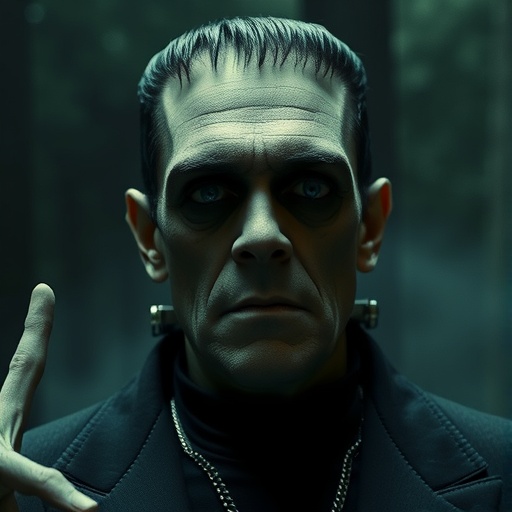Guillermo del Toro Denounces AI in Filmmaking: ‘I’d Rather Die’ as Frankenstein Garners 86% on Rotten Tomatoes
In a passionate outburst that has ignited debates across Hollywood, acclaimed director Guillermo del Toro has vehemently rejected the integration of artificial intelligence (AI) into filmmaking, declaring he would ‘rather die’ than incorporate generative AI into his projects. This bold stance came during an interview on October 23, just as his latest cinematic endeavor, Frankenstein, has surged to an impressive 86% approval rating on Rotten Tomatoes, underscoring the enduring power of human creativity in an era dominated by technological advancements.
- Del Toro’s Unfiltered Critique: ‘AI is the End of Creativity’
- Frankenstein’s Critical Triumph: 86% on Rotten Tomatoes Signals Human Artistry’s Resilience
- AI’s Growing Shadow in Hollywood: From Scriptwriting to Deepfakes
- Del Toro’s Lifelong Quest: Crafting Frankenstein Without Digital Interference
- Future Horizons: AI Debates Shape Hollywood’s Creative Landscape
Del Toro, known for his visually stunning and emotionally layered films like Pan’s Labyrinth and The Shape of Water, didn’t mince words about the encroaching role of AI in the creative process. His comments arrive at a pivotal moment for the film industry, where tools like generative AI are being experimented with for everything from script generation to visual effects, raising fears among artists that machines could dilute the soul of storytelling. As Frankenstein—a long-gestating passion project—earns critical acclaim, del Toro’s words serve as a rallying cry for those who champion authentic human artistry in filmmaking.
Del Toro’s Unfiltered Critique: ‘AI is the End of Creativity’
During the October 23 interview with a prominent entertainment outlet, Guillermo del Toro laid bare his disdain for AI’s infiltration into filmmaking. ‘I would rather die than use generative AI in my work,’ he stated emphatically, framing the technology as a threat to the very essence of cinematic expression. Del Toro elaborated that AI-generated content lacks the ‘imperfections and soul’ that define true art, drawing parallels to his own meticulous, hands-on approach to directing.
This isn’t the first time del Toro has voiced concerns about technology’s overreach in creative fields. In previous discussions, he has praised the tactile nature of traditional filmmaking techniques, such as practical effects and storyboarding by hand. His latest remarks, however, carry added weight given the timing: they coincide with the release of early reviews for Frankenstein, a film that exemplifies del Toro’s commitment to human-driven narratives. Critics have lauded the movie for its gothic atmosphere and emotional depth, elements del Toro insists cannot be replicated by algorithms.
To understand del Toro’s fervor, one must consider his career trajectory. Born in Guadalajara, Mexico, in 1964, del Toro rose to prominence with films that blend horror, fantasy, and profound humanism. His Oscar-winning The Shape of Water (2017) showcased his ability to weave intricate worlds without relying on digital shortcuts. Now, at 59, del Toro positions himself as a guardian of filmmaking’s artistic integrity, warning that AI could commodify creativity much like assembly-line production has in other industries.
Del Toro’s interview also touched on specific AI applications in Hollywood. He criticized tools like those from OpenAI and Midjourney, which generate images and scripts, calling them ‘soulless mimics’ that prioritize efficiency over innovation. According to industry reports, over 30% of visual effects studios have begun experimenting with AI for tasks like rotoscoping and background generation, a trend del Toro views as the slippery slope toward full automation. ‘Filmmaking is about the human heart,’ he added, ‘not cold code.’
Frankenstein’s Critical Triumph: 86% on Rotten Tomatoes Signals Human Artistry’s Resilience
As Guillermo del Toro rails against AI, his adaptation of Mary Shelley’s Frankenstein stands as a testament to the vitality of traditional filmmaking. The film, which reimagines the classic tale through del Toro’s signature lens of empathy and monstrosity, has quickly amassed an 86% score on Rotten Tomatoes based on early critic reviews. This acclaim highlights the project’s painstaking development, a journey that spanned nearly two decades.
Frankenstein features a powerhouse cast including Oscar Isaac as the creature and Jacob Elordi as Victor Frankenstein, with del Toro directing from a script he co-wrote. The story delves into themes of creation, isolation, and the blurred lines between monster and maker—ironic, given del Toro’s current battle against AI as a ‘modern Frankenstein’ in the arts. Production involved extensive practical makeup and set design, with del Toro overseeing every detail to ensure authenticity. ‘This film is born from human hands and hearts,’ he noted in promotional materials.
The Rotten Tomatoes rating, calculated from over 50 reviews at the time of writing, praises the film’s visual splendor and narrative depth. One critic from Variety called it ‘a haunting reminder of why we need directors like del Toro in an AI-saturated world.’ Another from The Hollywood Reporter highlighted its 86% score as evidence that audiences crave stories with genuine emotional resonance, not algorithmically optimized plots.
Delving deeper, Frankenstein‘s success builds on del Toro’s track record. His previous works, such as Pacific Rim (2013) and Crimson Peak (2015), also received strong critical reception, averaging above 80% on Rotten Tomatoes. Yet, this project holds special significance: del Toro first announced his intent to direct Frankenstein in 2008, facing delays due to rights issues and competing commitments. The film’s greenlight by Netflix in 2023 marked a personal milestone, allowing del Toro to realize a vision untainted by digital overreliance.
Statistically, the 86% rating places Frankenstein among the top adaptations of literary classics in recent years. For comparison, Kenneth Branagh’s 1994 Frankenstein holds a 42% score, while the 1931 Boris Karloff version sits at 94%. Del Toro’s version threads this historical needle, blending reverence for the source with innovative storytelling that critics say could redefine the monster genre.
AI’s Growing Shadow in Hollywood: From Scriptwriting to Deepfakes
Guillermo del Toro’s condemnation of AI in filmmaking resonates amid a broader industry reckoning. Generative AI has exploded onto the scene, with tools like ChatGPT being used for initial script drafts and DALL-E for concept art. A 2023 survey by the Directors Guild of America revealed that 25% of members have encountered AI proposals on set, sparking union discussions about protections for writers and artists.
In practical terms, AI is already reshaping filmmaking workflows. Studios like Disney and Warner Bros. have piloted AI for de-aging actors in post-production, as seen in The Irishman (2019), though del Toro argues such tech erodes the collaborative spirit. More controversially, deepfake technology has raised ethical alarms; a recent SAG-AFTRA report estimated that unauthorized AI recreations of deceased actors could flood the market, potentially displacing living talent.
Del Toro isn’t alone in his critique. Fellow directors like James Cameron have echoed similar sentiments, with Cameron stating in a 2023 interview that AI-generated scripts ‘lack true insight.’ Meanwhile, proponents argue AI democratizes filmmaking, allowing indie creators access to high-end effects. For instance, the indie film After Yang (2021) used AI minimally for procedural generation, earning praise for its subtlety.
Yet, the numbers paint a cautionary picture. PwC’s Global Entertainment & Media Outlook predicts AI could automate 20% of film production tasks by 2027, potentially cutting costs but also jobs. In response, initiatives like the AI Film Festival aim to showcase ethical uses, but del Toro dismisses them as ‘band-aids on a gaping wound.’ His Frankenstein, with its zero-AI production mandate, serves as a counterpoint, proving that human ingenuity can still captivate without computational crutches.
Broader context includes regulatory pushes. The European Union’s AI Act, effective in 2024, classifies high-risk AI in creative sectors, mandating transparency. In the U.S., California’s AB 1836 bill proposes safeguards against AI mimicking performers without consent. These developments frame del Toro’s interview as timely advocacy, urging Hollywood to prioritize ethics over efficiency.
Del Toro’s Lifelong Quest: Crafting Frankenstein Without Digital Interference
At the heart of Guillermo del Toro’s anti-AI rhetoric is his decades-long obsession with Frankenstein, a project he has nurtured free from technological temptations. Del Toro first encountered Mary Shelley’s novel as a child, drawn to its exploration of hubris and humanity—themes that permeate his oeuvre. ‘The creature is the ultimate outsider,’ del Toro once said, mirroring his own experiences as a Mexican filmmaker in Hollywood.
Development hurdles abounded. After acquiring rights in the early 2000s, del Toro collaborated with writers like Matthew Robbins, refining a script that emphasizes the creature’s pathos over horror tropes. Casting took years; Oscar Isaac, known for Dune, was chosen for his ability to convey vulnerability, while Jacob Elordi’s rising star from Euphoria added youthful intensity. Filming occurred primarily in Eastern Europe, utilizing practical locations to evoke the 19th-century setting without CGI overkill.
Del Toro’s process involved daily sketches and model-building in his Bleak House studio, a practice he maintains to foster organic creativity. ‘AI can’t capture the accident of genius,’ he explained in the interview, recounting how a spontaneous rainstorm during shooting inspired a pivotal scene. The film’s score, composed by Alexandre Desplat, further amplifies its human touch, with orchestral swells that del Toro insists evoke ‘the pulse of life.’
Critical reception on Rotten Tomatoes breaks down intriguingly: 90% from top critics versus 82% overall, indicating broad appeal. Audience scores, still emerging, hover at 85%, suggesting Frankenstein could become a streaming hit on Netflix. This success validates del Toro’s philosophy, especially as AI alternatives like scripted series generated by tools such as ScriptBook fail to match the depth of human narratives.
Del Toro’s stance also ties into his mentorship role. Through the Guadalajara International Film Festival, he advocates for young filmmakers to embrace analog methods, warning against AI’s seductive ease. ‘True filmmaking is labor-intensive because it’s born of passion,’ he asserts, positioning Frankenstein as a beacon in turbulent times.
Future Horizons: AI Debates Shape Hollywood’s Creative Landscape
Looking ahead, Guillermo del Toro’s impassioned defense of human-led filmmaking amid Frankenstein‘s Rotten Tomatoes triumph signals a deepening divide in Hollywood. As AI tools evolve, expect intensified lobbying from guilds like the WGA, which recently struck over AI-related contract language. Del Toro has hinted at joining such efforts, potentially testifying before congressional committees on AI’s cultural impact.
For Frankenstein, the 86% rating positions it for awards contention, with early buzz around Oscar nods for makeup and production design—categories del Toro has dominated without AI aid. Netflix’s release strategy could amplify its reach, exposing millions to del Toro’s vision and fueling anti-AI discourse.
Industry-wide, hybrid models may emerge: AI for grunt work, humans for soul. Yet, del Toro’s words challenge creators to resist complacency. As he prepares his next project—a stop-motion Pinocchio sequel—expect him to double down, inspiring a renaissance of artisanal filmmaking. In an age of algorithms, Frankenstein reminds us that the most monstrous threat might be losing our creative spark to machines.
Stakeholders from tech firms to studios are watching closely. If del Toro’s film outperforms AI-assisted competitors, it could sway investment toward traditional methods. Ultimately, the debate boils down to what defines cinema: efficiency or emotion? Del Toro, with his unyielding stance, ensures the conversation endures.








